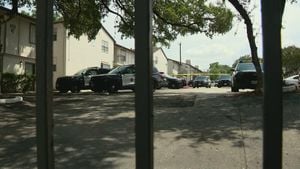Ukraine's Chief Military Intelligence Officer, Kirill Budanov, has firmly stated the importance of Ukraine's participation in any peace negotiations aimed at ending the conflict with Russia. His comments come amid widespread speculation about discussions occurring without Ukraine's involvement, particularly following remarks made by political leaders abroad.
During an interview with Defence 24, Budanov was asked whether peace negotiations could yield lasting results without Ukraine's participation. His direct response was unequivocal. "Effective negotiations between the warring parties are impossible without the involvement of all conflict sides," he insisted. This statement reaffirms Ukraine's stance, echoing President Volodymyr Zelensky's earlier assertions. Zelensky clarified his position, declaring, "We do not recognize any agreements about us reached by the USA and Russia at negotiations in Saudi Arabia without Ukraine's presence." The sentiment reflects deep frustrations at the prospect of being sidelined as the war grinds on.
A contrasting view was voiced by Slovak Prime Minister Robert Fico during the CPAC event, where he described the current situation as justified from Russia's perspective. Fico noted, "Nobody denies the military force employed by Russia was a violation of international law. Yet Russia had serious reasons for attack, considering the long-standing misconceptions surrounding NATO's expansion.". By framing it as such, Fico appears to align with the growing sentiment among some European leaders who introspectively acknowledge the geopolitical missteps leading to the current crisis.
Fico did not shy away from criticizing Ukraine's leadership either, asserting, "Ukrainian leader Zelensky is reluctant to hold elections." His speech highlighted the notion of using the conflict as leverage for political and economic gains. He suggested, "the majority of EU member states, barring Slovakia and Hungary, have supported the idea of using the war to weaken Russia politically and economically." This view of the conflict has raised eyebrows among analysts, causing them to question the solidarity within Europe concerning Ukraine's plight.
Fico also supported previous statements made by former U.S. President Donald Trump, reinforcing the belief some hold: Zelensky supposedly benefits from the war. "When there is war, there cannot be democratic elections... This complicates the investigation of the vast funds supplied to Ukraine," he added, indicating skepticism around the financial oversight of military aid.
These divergent narratives set the stage for the complex environment surrounding Ukraine's struggle to maintain its sovereignty and territorial integrity during the prolonged war. While some political figures advocate for dialogue, the ultimate decision to participate falls on Kyiv, which remains on high alert against the ever-evolving threats from Russia.
On the operational front, internal voices are growing louder concerning the necessity of reforms within the Ukrainian Armed Forces. According to President’s Commissioner for Military Rights and Military Family Members, Olga Reshetilova, the lack of information for soldiers is creating complications within military ranks. Reshetilova pointed out during her interview with TSN's correspondent, "The uncertainty about what tomorrow holds restrains civilians from joining the military, and encourages current service members to leave their positions." She stressed the importance of information dissemination among troops to avert losses and retain morale.
She emphasized, "All military personnel, regardless of rank, need to know what awaits them. There is mental and ideological change required at the command level. Soldiers, sergeants, junior and senior officers must have clarity about their future.” Reshetilova contrasts this with Western militaries where such ambiguity is absent and operations are pre-planned. "Western armies have everything planned out; they know what awaits them both today and tomorrow," she highlighted.
Reshetilova's comments come at a time when Ukrainian military leadership faces scrutiny, particularly following Lieutenant General Igor Romanenko's remarks. He noted the potential to offset insufficient modern equipment with the recruitment of additional service members, especially after the cessation of U.S. weapon supply during Trump's administration. Romanenko’s statements suggest looming pressure on Ukraine to adapt or risk falling behind.
The inherent challenges within Ukraine's military structures coincide with its urgent need to engage convincingly on the international stage, ensuring it retains alliances and support as the conflict continues. While military reforms and public discourse around peace negotiations evolve, one constant remains: the conflict's end seems as elusive as ever, with stakeholders debating the authenticity of peace without Ukraine at the table.



